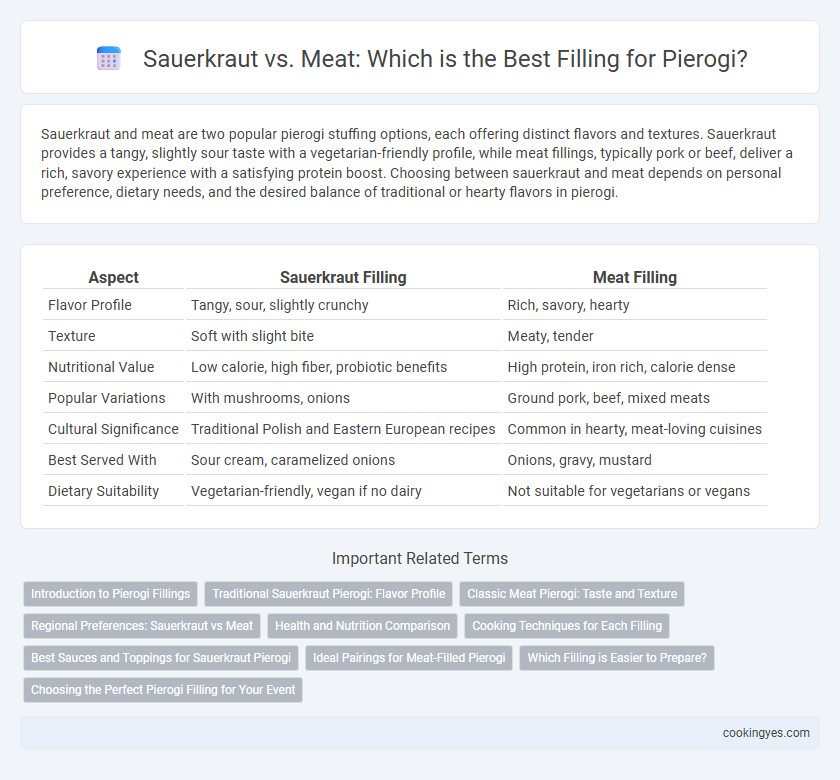Sauerkraut and meat are two popular pierogi stuffing options, each offering distinct flavors and textures. Sauerkraut provides a tangy, slightly sour taste with a vegetarian-friendly profile, while meat fillings, typically pork or beef, deliver a rich, savory experience with a satisfying protein boost. Choosing between sauerkraut and meat depends on personal preference, dietary needs, and the desired balance of traditional or hearty flavors in pierogi.
Table of Comparison
| Aspect | Sauerkraut Filling | Meat Filling |
|---|---|---|
| Flavor Profile | Tangy, sour, slightly crunchy | Rich, savory, hearty |
| Texture | Soft with slight bite | Meaty, tender |
| Nutritional Value | Low calorie, high fiber, probiotic benefits | High protein, iron rich, calorie dense |
| Popular Variations | With mushrooms, onions | Ground pork, beef, mixed meats |
| Cultural Significance | Traditional Polish and Eastern European recipes | Common in hearty, meat-loving cuisines |
| Best Served With | Sour cream, caramelized onions | Onions, gravy, mustard |
| Dietary Suitability | Vegetarian-friendly, vegan if no dairy | Not suitable for vegetarians or vegans |
Introduction to Pierogi Fillings
Pierogi fillings vary widely, with sauerkraut and meat among the most popular traditional options. Sauerkraut offers a tangy, fermented flavor rich in probiotics, often combined with mushrooms or onions for added depth. Meat fillings, typically ground pork or beef, provide a savory and hearty taste, making them a preferred choice for those seeking a robust and protein-rich pierogi experience.
Traditional Sauerkraut Pierogi: Flavor Profile
Traditional sauerkraut pierogi feature a tangy, slightly sour flavor that balances perfectly with the dough's mildness, offering a refreshing contrast to richer fillings. The fermented cabbage provides a crunchy texture and a complex taste profile enriched by subtle earthy and umami notes, distinguishing it from meat-stuffed varieties. This classic combination highlights Eastern European culinary heritage, emphasizing fermented ingredients that enhance digestion and add depth to the comforting pierogi experience.
Classic Meat Pierogi: Taste and Texture
Classic meat pierogi feature a rich, savory filling made from ground pork, beef, or a combination, offering a hearty taste and tender texture that contrasts with the soft, doughy wrapper. The meat filling is often seasoned with onions, garlic, and spices to enhance flavor depth while maintaining a juicy consistency. This combination creates a satisfying balance between the robust, meaty interior and the pillowy pierogi dough, making it a traditional favorite.
Regional Preferences: Sauerkraut vs Meat
Sauerkraut and meat pierogi fillings reflect distinct regional preferences across Eastern Europe, with sauerkraut popular in northern Poland and Lithuania for its tangy, fermented flavor that complements sour cream toppings. In contrast, meat-filled pierogi prevail in southern Poland, Ukraine, and Russia, offering a heartier, protein-rich option often made from ground pork or beef mixed with onions and spices. These regional variations highlight local agricultural practices and cultural tastes, influencing pierogi recipes passed down through generations.
Health and Nutrition Comparison
Sauerkraut-stuffed pierogi provide a low-calorie, high-fiber option rich in probiotics, which support digestive health and boost the immune system. Meat-filled pierogi offer a higher protein content and essential nutrients like iron and vitamin B12, beneficial for muscle repair and energy production. Choosing sauerkraut emphasizes gut health and lower fat intake, while meat stuffing delivers greater protein and nutrient density for sustained energy.
Cooking Techniques for Each Filling
Pierogi stuffed with sauerkraut require thorough rinsing and sauteing with onions until tender to reduce acidity and enhance flavor before filling. Meat fillings, often made from ground pork, beef, or a combination, benefit from slow cooking or pan-frying with aromatics to develop richness and ensure proper texture. Both cooking techniques emphasize moisture control to prevent soggy dough and maintain the classic pierogi bite.
Best Sauces and Toppings for Sauerkraut Pierogi
Sauerkraut pierogi pair best with sour cream, caramelized onions, and crispy bacon bits to enhance their tangy, fermented flavor. Mustard sauce and dill-infused sour cream can also complement the acidity of sauerkraut, balancing the richness of the dough. For a richer topping, melted butter infused with garlic or fresh herbs like chives provides a savory contrast to the tartness of sauerkraut stuffing.
Ideal Pairings for Meat-Filled Pierogi
Meat-filled pierogi pair exceptionally well with caramelized onions and a side of sour cream to balance their rich, savory flavors. Sauerkraut offers a tangy contrast but is traditionally favored in vegetarian pierogi, while hearty meats like ground beef, pork, or a blend enhance the robust taste and texture of meat-stuffed varieties. Incorporating herbs such as dill or parsley complements the meat, creating an ideal flavor profile for pierogi enthusiasts seeking a savory experience.
Which Filling is Easier to Prepare?
Sauerkraut filling for pierogi is easier to prepare, requiring only sauerkraut, onions, and seasoning, which can be quickly sauteed without extensive cooking. Meat filling involves grinding, seasoning, and often pre-cooking the meat, making the process more time-consuming and complex. Sauerkraut's simplicity and minimal ingredients make it ideal for quick and straightforward pierogi stuffing preparation.
Choosing the Perfect Pierogi Filling for Your Event
Choosing between sauerkraut and meat for pierogi filling depends on the event's tone and guest preferences. Sauerkraut offers a tangy, vegetarian-friendly option rich in probiotics, ideal for casual or health-conscious gatherings. Meat fillings, often made from pork or beef, provide a hearty and savory choice perfect for traditional or festive celebrations.
Sauerkraut vs Meat for Pierogi Stuffing Infographic

 cookingyes.com
cookingyes.com